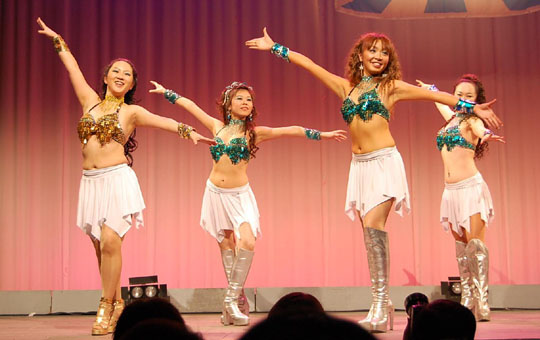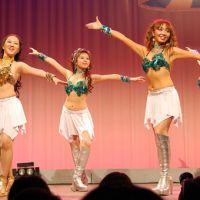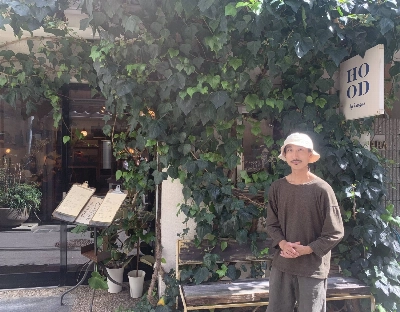Although the weather was cold and cloudy, sweat was pouring from those who made it over to the Barbaros New Year Party 2009, an event hosted by G.R.E.S. Barbaros, 17-time winner of the Asakusa Samba Carnival and one of the largest dance teams in the nation dedicated to the Brazilian musical genre.
The event, which took place Jan. 18 at the Urayasu Citizens' Plaza in Chiba Prefecture east of Tokyo, featured both music and dance performed by 18 groups specially assembled for the event and consisting of members from both Barbaros and other teams active in the Kanto region.
Food and drinks were served in the main hall, where more than 400 guests — both Japanese and foreign — moved to the pulsing rhythm. The performances were broad-ranging, from dance groups swinging to beat-heavy DJ mixes of modern samba tunes, to bands playing traditional Brazilian instruments such as the pandeiro (a type of hand frame drum) and cavaco (a small string instrument resembling a guitar) to accommodate songs recited in Portuguese.
"We basically want to have fun with the music," said Kazuo Fukushima, organizer of the event and a 25-year-veteran percussionist for Barbaros. Fukushima, still out of breath from playing drums in the previous performance, said that unlike the professional dance groups in Brazil, their Japanese counterparts were more relaxed, and placed more emphasis on unity and cooperation than technique.
"I guess you could say we're similar to a culture school," a place where both the old and young, Japanese or non-Japanese can come together to enjoy the music, said Fukushima, who joined the group back in 1983 when there were only 20 or so members — less than one-tenth of its current size.
Barbaros practices twice a week, and Fukushima says that by far the largest event the group prepares for is the Asakusa Samba Festival's samba parade contest. The Asakusa festival is said to be the second-largest samba event following the Rio Carnival in Brazil.
Over 3,000 costumed participants gather every year to roam the streets of Asakusa and compete for the top prize. Barbaros, as Fukushima proudly points out, won last year's contest, and plans on doing so again this year.
Many of the guests at the event in Urayasu either participated on stage or were members of other teams not performing that night.
"I had a roommate in college from Sao Paulo who got me hooked to the music," said Canadian Lou Leclerc, who has been a member of samba team G.R.E.S. Liberdade for 11 years. Leclerc, who also organizes various club events around Tokyo, said that he began looking for a samba team that he could join immediately after he first arrived to Japan in 1997.
"Samba to me is a physical expression of music," Leclerc said, before he returned to the crowd dancing in front of the stage.
Chihiro, a dancer for Barbaros, and Lena, a member of G.R.E.S. Alegria, both performed with a special group assembled for the day, Axe Gals & Guys 2008.
Chihiro, who works in an office during the day, said dancing the samba was a way to let her self go, to remove herself from her daily routine. "I just enjoy sweating it out," she said.
Lena, on the other hand, said she was attracted by the music. "Samba, afro-beat, I like music with a strong rhythm," she said.
Both dancers said their off-time hobby was a secret at their workplace, and laughed at the thought of their coworkers discovering their hidden passion.
"They'd be very surprised," the two said giggling.
Junya Terada, who was at the party with girlfriend Rie Takahashi, said he came because a friend was performing that day. Although he admitted he didn't know much about samba, he liked it a lot, especially now, after having practiced capoeira (an Afro-Brazilian blend of martial-arts and dance) for three years. Takahashi also seemed thrilled to be at the event, and said it had now sparked an interest in Brazilian culture.




















With your current subscription plan you can comment on stories. However, before writing your first comment, please create a display name in the Profile section of your subscriber account page.